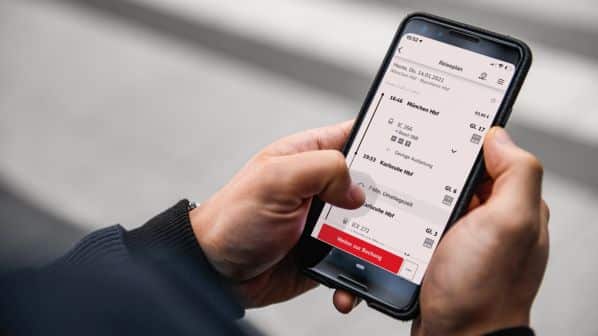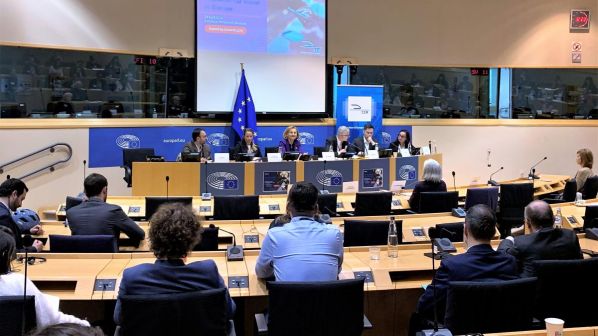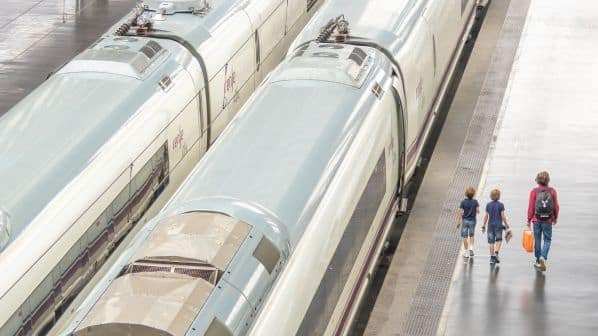GERMAN Rail (DB) has said it will launch an appeal against a wide-ranging ruling by the German Federal Cartel Office (BKartA) that explicitly aims to open the online ticket retailing market to competition.
The ruling would force DB to pay commission to third-party resellers, and introduce new rules that would potentially route traffic to third-party websites rather than to the DB website even if customers entered search terms for the DB site.
BKartA launched an investigation into DB’s approach towards third-party mobility platforms following complaints by independent providers including Trainline and Omio that they were being prevented from accessing real-time data and were insufficiently reimbursed for selling DB tickets. They also claimed they were being prohibited from offering discounts and restricted in other ways by stringent contractual terms imposed by DB.
Aspects of the complaint concerning real-time data were largely superseded by the time the office made its final ruling, as DB has made open-source data available in recent years and new European Union (EU) regulations on rail passenger rights that came into force on June 7 require such data to be shared by law. However, a key part of the decision concerns DB’s payments to third-party online platforms.
The ruling will crucially oblige DB to remunerate independent mobility platforms for their services at a level that at least covers DB’s own long-run average incremental costs for rail ticketing. The office also found to be unacceptable DB contract terms that impose major restrictions on third-party marketing campaigns and prevent them from offering discounts over and above those offered by DB itself.
The office in its decision has clearly indicated that competition in the mobility platform market is desirable.
“We want to prevent DB, with its own entrepreneurial interests, from expanding its dominance in rail passenger transport to future-oriented mobility markets and innovative mobility providers being slowed down,” says BKartA president, Mr Andreas Mundt. He added that after long-running negotiations with DB, the office had decided to order that the changes be made as DB would not make them voluntarily.
Mundt emphasised the competition authority’s view that DB was abusing its current dominant position in the rail ticketing market to build a similarly dominant mobility platform. “State-owned DB, which is vertically integrated from network operation to ticket distribution, is the incumbent rail operator in Germany,” he said. “The services of third-party mobility platforms making integrated route planning possible for passengers are not conceivable without including DB’s offers and traffic data. DB is therefore subject to abuse control under competition law and has to fulfil special obligations towards rival platforms.”
“This specifically concerns data sharing, bans on advertising, vertical price specifications, far-reaching bans on discounts and the withholding of different commissions for third-party platforms,” Mundt said, adding that “without effective enforcement under competition law, the business models of (third-party) mobility platforms cannot function in competition with DB.”
The reaction from groups such as AllRail, which represents new rail operators and third-party ticket retailers, suggests that the German decision sets a precedent for Europe. AllRail argues that the European Commission (EC) should act now to ensure that BKartA’s ruling, if enforced, becomes standard practice across all EU markets. The association of new entrants says that access to real-time data, open use of all relevant marketing techniques and keywords, plus fair and non-discriminatory commercial terms for ticket retailers , must be applied to all dominant operators and become a framework for the European rail ticketing market.
“Today’s decision by BKartA is a crucial step in the right direction for German rail travellers,” says Trainline CEO, Mr Jody Ford. “It is a categoric and clear decision in favour of a level playing field between DB and digital platforms. Having recognised DB’s anti-competitive behaviour over many years, this decision provides not only the framework so that millions of people will access the benefits of digital innovation and choice, but also sets a vital precedent for the ticketing sector in Germany and Europe.”
DB reaction
Over the last two decades DB has built a sophisticated digital retail platform, initially providing ticket machines at stations able to offer a wide range of tickets for both domestic and international journeys, and online application channels that have progressively replaced station ticket sales while offering even greater functionality.
The electronic DB timetable, which provides data for apps, websites and station systems, provides information on services across Europe, as do some other European operators using the same software supplied by Siemens subsidiary Hacon.
The German national operator has itself reacted “with great incomprehension” to the BKartA ruling requiring major changes to its sales approach. DB says the decision goes far beyond the original complaints which related to data access, notably requiring DB to pay third-party resellers even if their services do not offer any added value for DB due to the effectiveness of its own in-house system.
DB also points out that the major online mobility platforms are internationally owned and backed by major American banks, global asset management companies and investment funds.
It also says the decision also obliges it to release its trademarked terms and sales channel designations such as DB Navigator and bahn.de for search engine marketing of other online platforms, meaning that if customers search for the term “bahn.de,” for example, they may end up on an alternative online platform. In this way, these platforms can steer customers away from DB channels towards their own channels.
DB says the decision has far-reaching economic consequences, pointing out that the high additional burdens created by the enforced changes to its sales model are not offset by any corresponding savings or additional income. It says the financial burdens imposed on it by the decision will “in the worst case lead to higher ticket prices and less investment.” DB immediately announced will appeal against the decision on the basis that it intervenes in key issues concerning the entrepreneurial freedom of the company.
The BKartA ruling comes after the EC opened a formal investigation in May to assess whether national operator Renfe may have abused its dominant position in the Spanish passenger rail market by refusing to supply all its content and real-time data to rival ticketing platforms.



